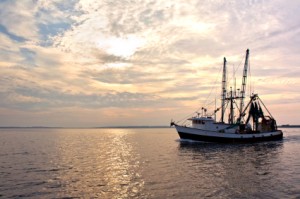Rebuilding the Gulf’s Shattered Fishing Industry ? On Land
 Today NOAA announced further fishing closures in the Gulf of Mexico due to the BP Deepwater Horizon oil spill. Now a total of 37 percent of federal Gulf waters are off limits to fishing, an area of nearly 89,000 square miles where NOAA considers fish and shellfish potentially too toxic for human consumption. For a region where commercial fishing is a vital part of the economy, the future of the region grows increasingly uncertain with each barrel of oil spewed into the deep Gulf waters.
Today NOAA announced further fishing closures in the Gulf of Mexico due to the BP Deepwater Horizon oil spill. Now a total of 37 percent of federal Gulf waters are off limits to fishing, an area of nearly 89,000 square miles where NOAA considers fish and shellfish potentially too toxic for human consumption. For a region where commercial fishing is a vital part of the economy, the future of the region grows increasingly uncertain with each barrel of oil spewed into the deep Gulf waters.
There’s a solution: Rebuild the Gulf of Mexico fishery on land. Investing in “next-generation” sustainable land-based, closed-containment recirculating aquaculture systems (RAS) could keep the Gulf region in the seafood business profitably, while creating green jobs and reducing fishing pressure on wild stocks. What is “next-generation” RAS aquaculture? From the outside, many of the systems look like an ordinary warehouse. Inside, they’re a specially-constructed system of pumps and filters that recycle 99 percent of their water and grow healthy and heathful fish without chemicals, antibiotics or genetically-modified anything. Read more




 Tune in to NPR station WGCU (Southwest Florida) on Wednesday, August 26, 2009 at noon Eastern/9am Pacific. Dr. David E. Guggenheim, the “Ocean Doctor,” will be part of a radio discussion on “
Tune in to NPR station WGCU (Southwest Florida) on Wednesday, August 26, 2009 at noon Eastern/9am Pacific. Dr. David E. Guggenheim, the “Ocean Doctor,” will be part of a radio discussion on “

 HAVANA, CUBA – Final preparations are now underway for an August expedition to explore and map one of the least known areas of the Gulf of Mexico — Cuba’s northwestern coastal waters, including Cuba’s spectacular Los Colorados barrier reef. A joint effort of the University of Havana’s Centro de Investigaciones Marinas (Center for Marine Research) and the Harte Research Institute for Gulf of Mexico Studies at Texas A&M University-Corpus Christi, this, the fourth expedition in a multiyear project entitled, Proyecto Costa Noroccidental (Project of the Northwest Coast). (See
HAVANA, CUBA – Final preparations are now underway for an August expedition to explore and map one of the least known areas of the Gulf of Mexico — Cuba’s northwestern coastal waters, including Cuba’s spectacular Los Colorados barrier reef. A joint effort of the University of Havana’s Centro de Investigaciones Marinas (Center for Marine Research) and the Harte Research Institute for Gulf of Mexico Studies at Texas A&M University-Corpus Christi, this, the fourth expedition in a multiyear project entitled, Proyecto Costa Noroccidental (Project of the Northwest Coast). (See  Until that tranquil morning in late June 1974, the sum total of my SCUBA diving experience had been in a landlocked state, in a stifling, moldy indoor YMCA pool in the Philadelphia suburbs and a Pennsylvania quarry, flooded with icy soup-green water. Barely comprehending the new world of pungent humidity, mountainous afternoon cumulus clouds, and lush tangles of flowering succulents I experienced at water’s edge during my first visit to the Florida Keys, I was wholly unprepared later that morning when I found myself seated in sugar-white sand with 40 feet of warm, clear aquamarine water above my head. As impossibly multi-colored fish passed slowly within reach before my wide 15-year-old eyes, my gaze broadened as I marveled at the towering jetties of coral around us, living layer cakes of corals upon corals, brown and mustard rock-like structures, encrusted with brilliant red, violet and orange coralline fans and branches, swaying in the warm, nourishing current and, like eager spring blossoms, reaching toward the dancing sunlight scattered on the surface above.
Until that tranquil morning in late June 1974, the sum total of my SCUBA diving experience had been in a landlocked state, in a stifling, moldy indoor YMCA pool in the Philadelphia suburbs and a Pennsylvania quarry, flooded with icy soup-green water. Barely comprehending the new world of pungent humidity, mountainous afternoon cumulus clouds, and lush tangles of flowering succulents I experienced at water’s edge during my first visit to the Florida Keys, I was wholly unprepared later that morning when I found myself seated in sugar-white sand with 40 feet of warm, clear aquamarine water above my head. As impossibly multi-colored fish passed slowly within reach before my wide 15-year-old eyes, my gaze broadened as I marveled at the towering jetties of coral around us, living layer cakes of corals upon corals, brown and mustard rock-like structures, encrusted with brilliant red, violet and orange coralline fans and branches, swaying in the warm, nourishing current and, like eager spring blossoms, reaching toward the dancing sunlight scattered on the surface above.